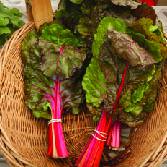Miniclover: The Secret to a Low-Maintenance and Sustainable Lawn Alternative
Creating a beautiful outdoor space doesn’t have to mean constant mowing and watering. With Outsidepride’s Miniclover seeds, you can grow a water-wise, low-fuss alternative to traditional grass.
Before diving in and planting a Miniclover lawn, there are some keys facts to know about Miniclover seeds. This blog article will provide you with helpful tips and tricks for growing a successful Miniclover lawn or landscape space.

What is Miniclover?
Miniclover, a unique groundcover and lawn alternative, combines minimal maintenance with maximum visual appeal. It is naturally self-fertilizing and thrives in dry conditions, helping reduce the need for regular watering or fertilizing. With a few early trims, it can be maintained at a compact 3 inches, but if left alone, it can grow taller, typically between 4 and 6 inches. Miniclover also produces charming white flowers during the summer if it is not mowed.
Miniclover shines on its own or mixes beautifully with other groundcovers such as red creeping thyme, creeping jenny or sedum for a more diverse lawn alternative. This perennial white clover is a versatile choice for everything from sloping hillsides to walkways, borders or open lawns. Used alone or with other seeds, Miniclover offers a plethora of benefits for your outdoor space.

Benefits of Miniclover Lawns
Outsidepride Miniclover or microclover is a standout for lawns in dry climates. It enhances soil health while reducing the need for frequent watering or fertilizing, making it both eco- and budget-friendly. Even a small amount of Miniclover can boost color, improve drought resistance and prevent new weeds.
By acting as a natural fertilizer by adding nitrogen to the soil, Miniclover promotes healthier soil for greener lawns. Each Nitro-Coat seed is inoculated with the right Rhizobium strains and is the key to successful growth and establishment.
Miniclover stands out as a durable, wear-tolerant lawn solution. Turf that includes Miniclover has been shown to outperform traditional grass in high-traffic conditions. Miniclover enhances turf resilience by permanently fertilizing the sward, which boosts its overall durability. Its stolons spread through the grass, integrating evenly and blending seamlessly with the surrounding lawn. Even the most wear-resistant turf varieties benefit from the addition of Miniclover, making it a strong fit for athletic fields, parks and other high-traffic landscapes.
Adding Miniclover seeds to your lawn can also assist with erosion control. Miniclover provides a dense mat that helps prevent soil erosion while maintaining a lush, green appearance and reducing the need for fertilizers.

Seeding a Lawn with Miniclover
Miniclover seeds are incredibly beginner-friendly and suitable for planting throughout most regions of the U.S.
Here is a list of tips to plan your Miniclover seed planting for success:
· Seeding Time: Miniclover seeds should be planted in late winter, early spring or late summer in the southern parts of the U.S. For the northern region of the country, early spring or late summer is ideal.
· Prepare the Soil: Rake the area that will be planted and remove any debris if planting straight Miniclover.
· Seeding Rate: For new plantings, seed Miniclover at 1-2 lbs per 1,000 square feet. For overseeding, seed Miniclover at 1/2 lb per 1,000 square feet.
· Spread the Seeds and Keep Moist: Spread the seeds on the soil’s surface or lightly rake it in. keep the seeds moist, not letting it dry out between waterings. Seed at approximately 1/8 inch deep.
· Seeding Techniques: Coated with Nitro-Coat for better establishment, it supports no-till, minimum-till and broadcast seeding techniques.
· Germination Period: 1-2 weeks.
· Mature Plants: 2-3 months.
· Flower Blooms: Early summer, if the Miniclover is not mowed.
Versatile and resilient, Miniclover grows well in a range of climates and soil types. It can handle partial shade, drought and even periods of excess moisture, but avoid planting it in flood-prone spots or where water tends to pool. Similar to planting grass seed, keeping the soil consistently moist during the germination period is key to strong establishment.
Areas with light to moderate shade, such as those found on golf courses or in public parks, are well-suited for Miniclover and other dwarf, low growing, microclovers. It also improves soil by aerating it, which helps reduce compaction. Compared to traditional lawn grasses, Miniclover handles compacted areas more effectively and draws water from deeper in the soil through its longer roots.

Customer Testimonials
Miniclover seeds are an Outsidepride customer “fan favorite.” But, don’t take it from us. – Here are some testimonials from Outsidepride customers who have shared their experience using Miniclover seeds with us.
· “What can I say besides, WOW! I bought Miniclovers to plant in my fairy garden and I couldn't be happier with the current results! I planted these Saturday evening and by Friday (today) they are well established and growing like crazy, in less than a week. Everyone in my house is stunned by how fast they have grown and how they have turned out! I will be buying these again in the future for my fairy gardens! I highly recommend them to you if you are looking to buy! I couldn't be more pleased!!”
· “Grew quickly and spread quickly through my lawn. Stays lowers than regular clover. It has reduced how often I mow, water and fertilize my lawn.”
· “Have bought several of the little beauties and my grass is green.....completely....for the first time in 38 years!”
· “I love, love, love this clover. I've been planting it for about a year now. Partly it's mixed into my grass. This reduces the need for water and fertilizer. The biggest benefit is that it stays green with dog pee. Yay!! On the far side of my yard, I've planted only clover between the pavers. It's a much brighter, prettier green than the thyme I have in that area. It's so easy to plant and maintain. Just a once-a-month mow or cut. Germinates quickly. I'm hoping to cover most of my backyard in clover where I used to have lawn to help California deal with drought. My friends mock me, but I tell you I love my clover!”
Learn more about Miniclover, an easy-to-grow, low-maintenance seed you can add to your existing lawn to improve overall lawn health or use as a complete lawn alternative: www.outsidepride.com.































